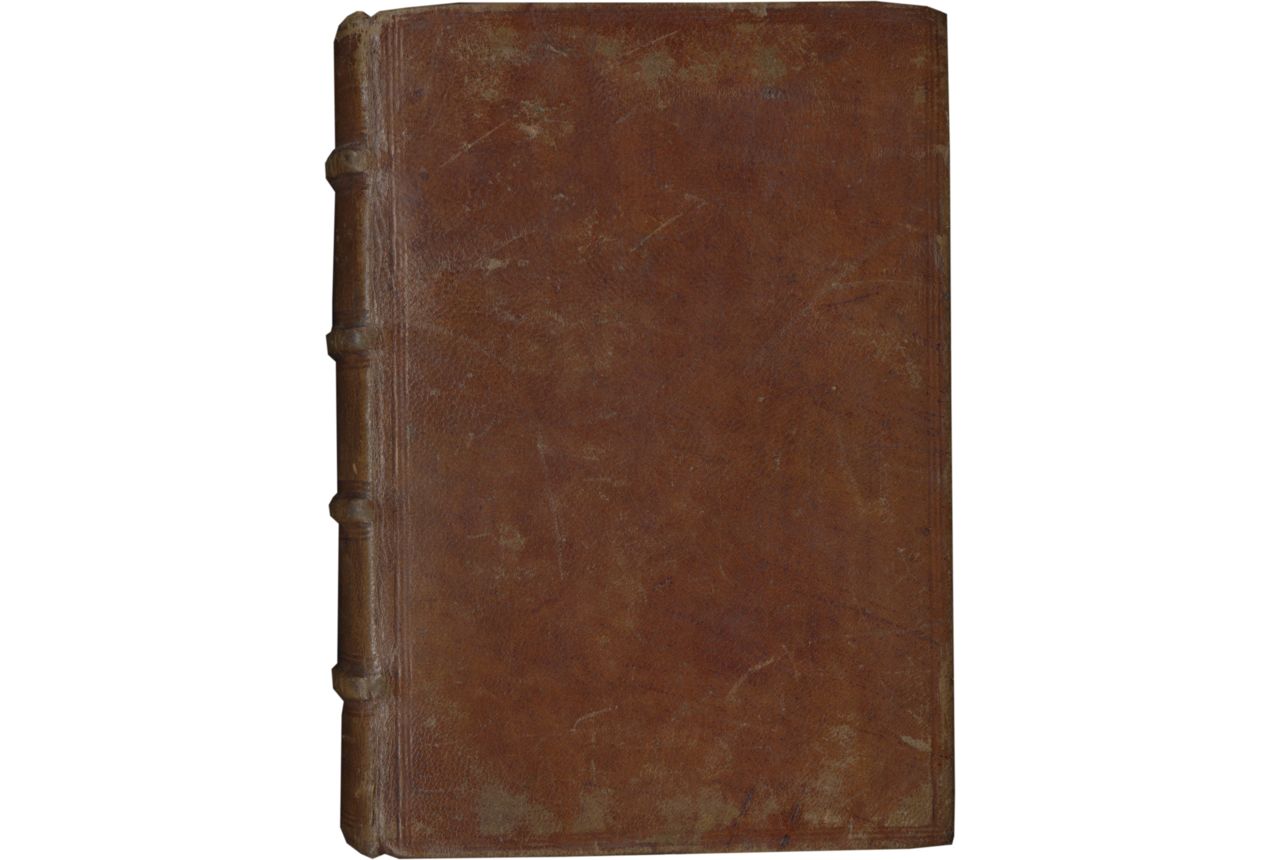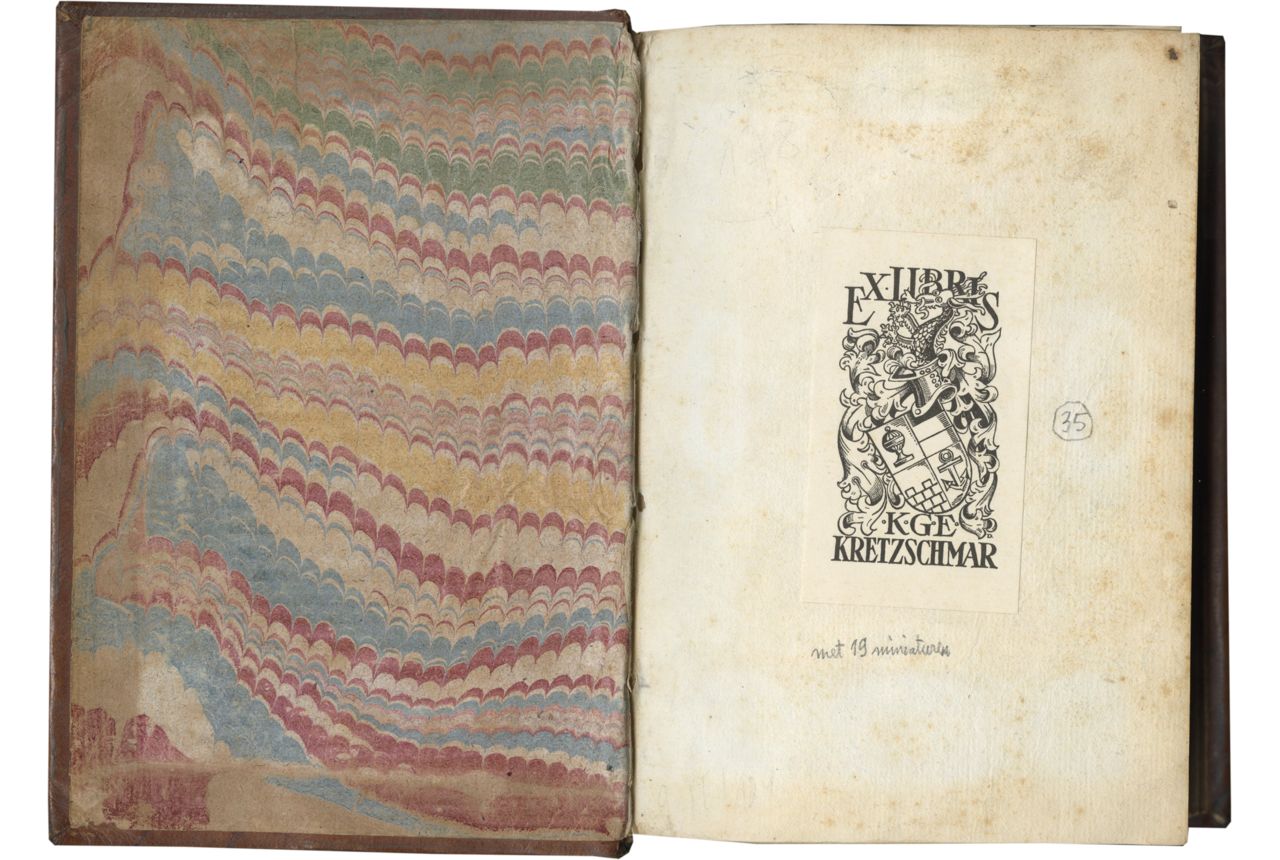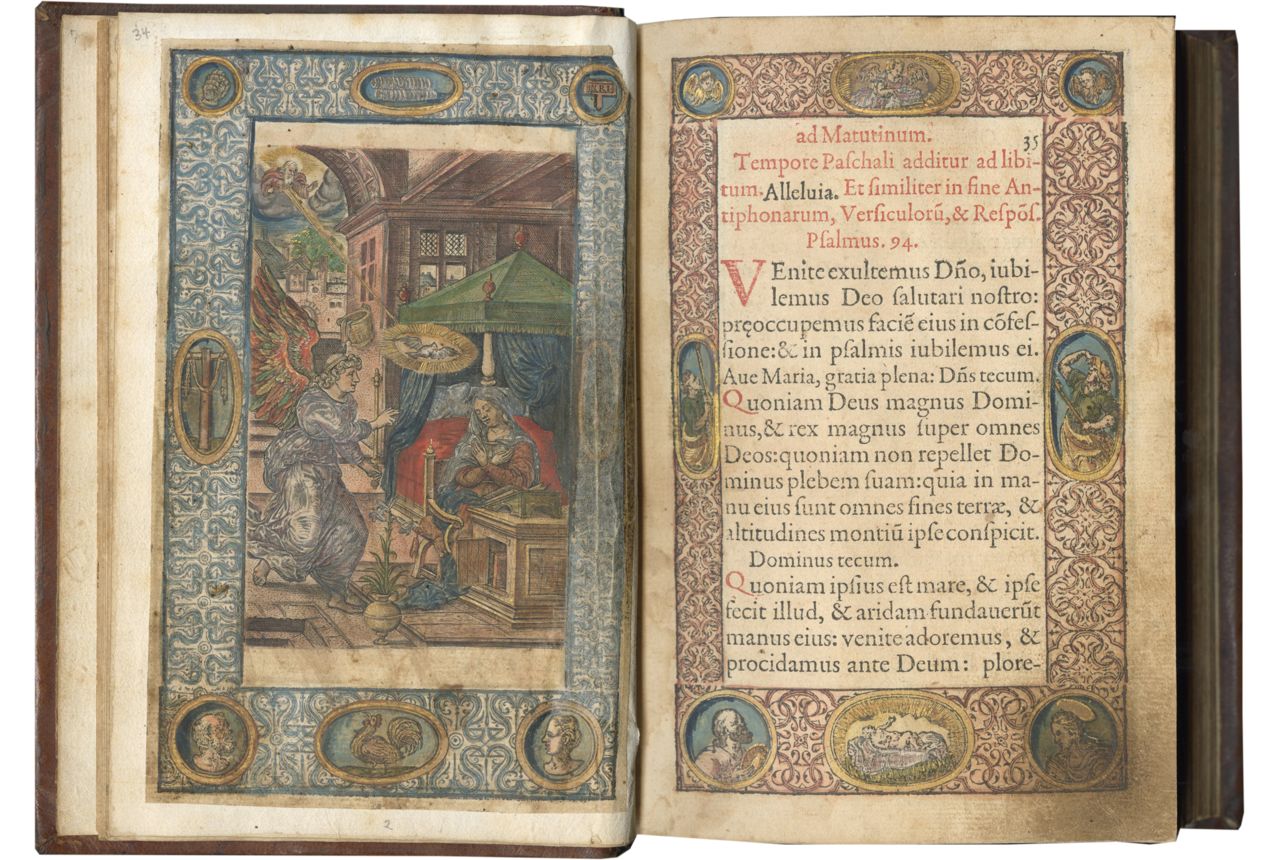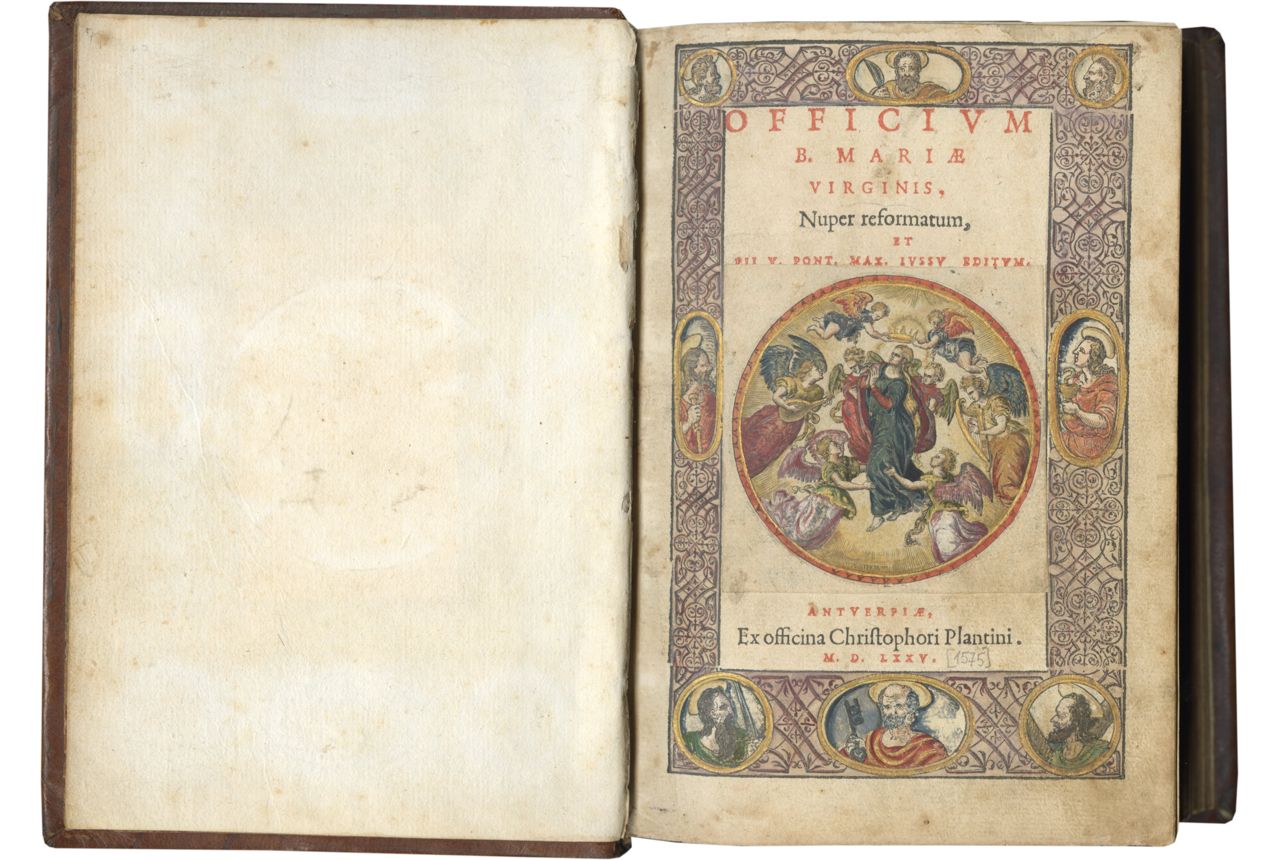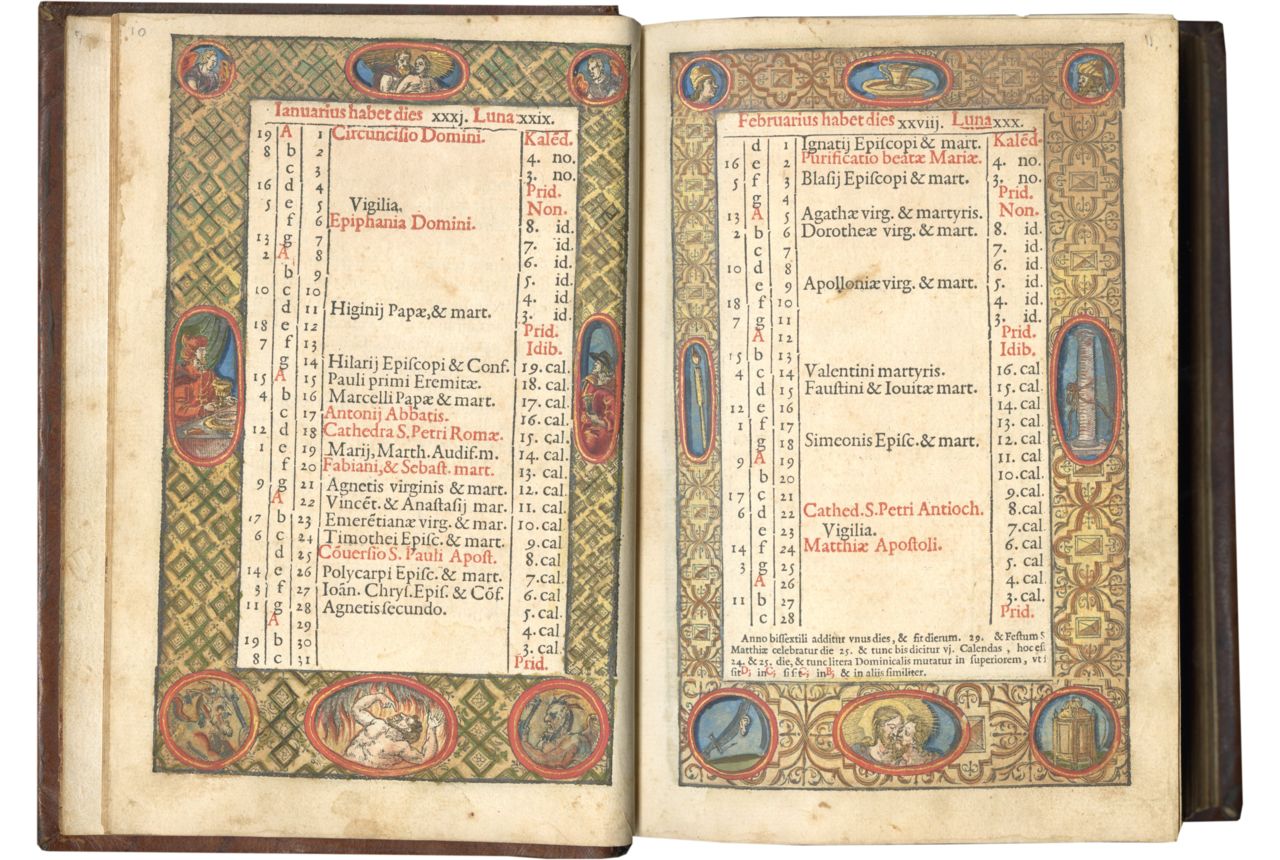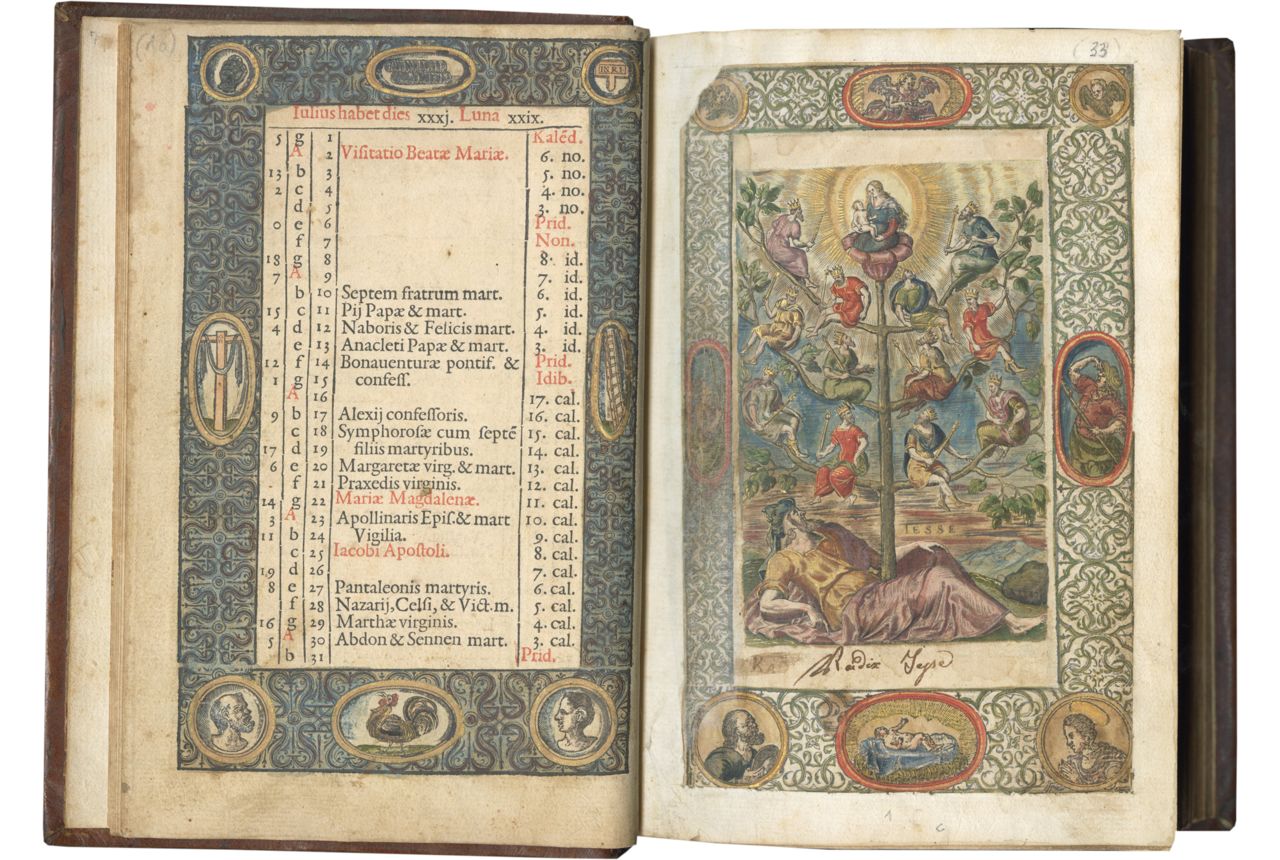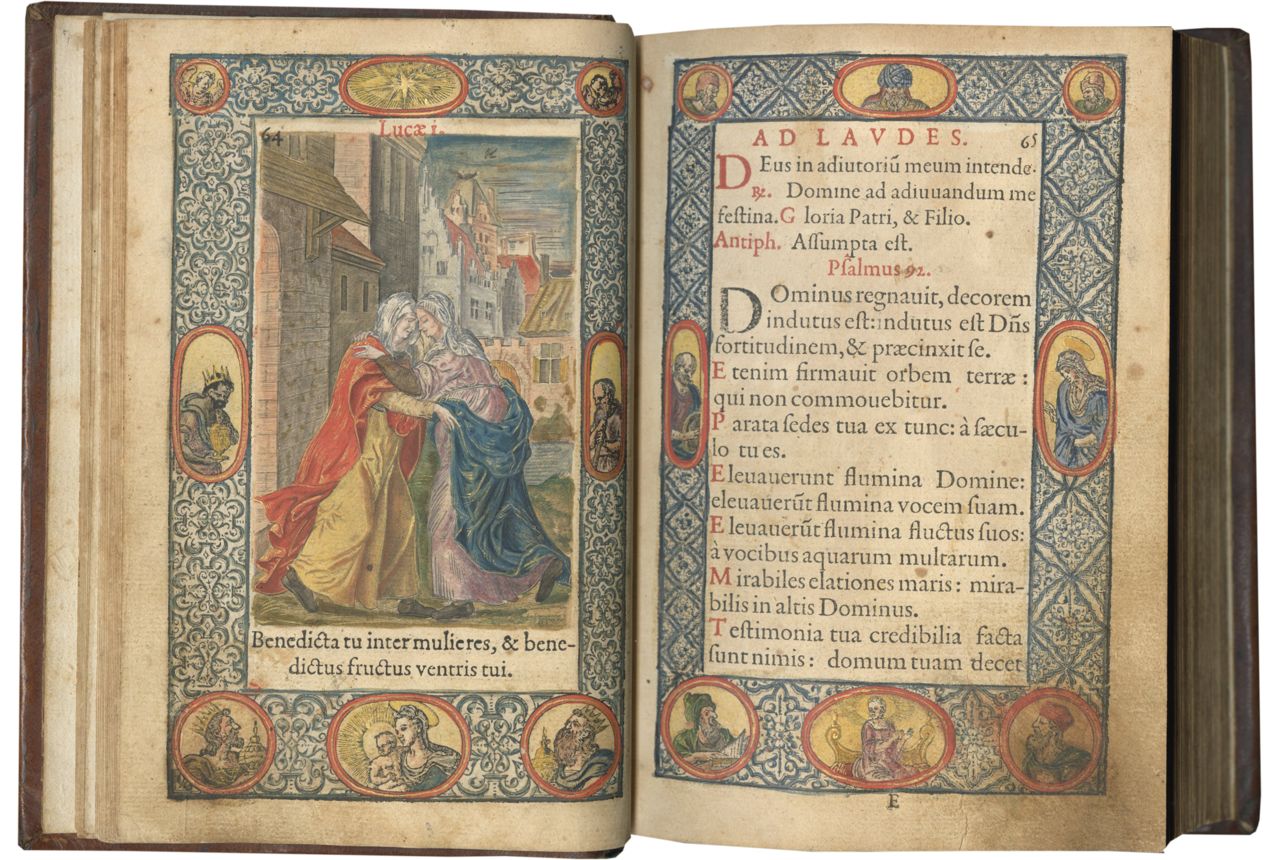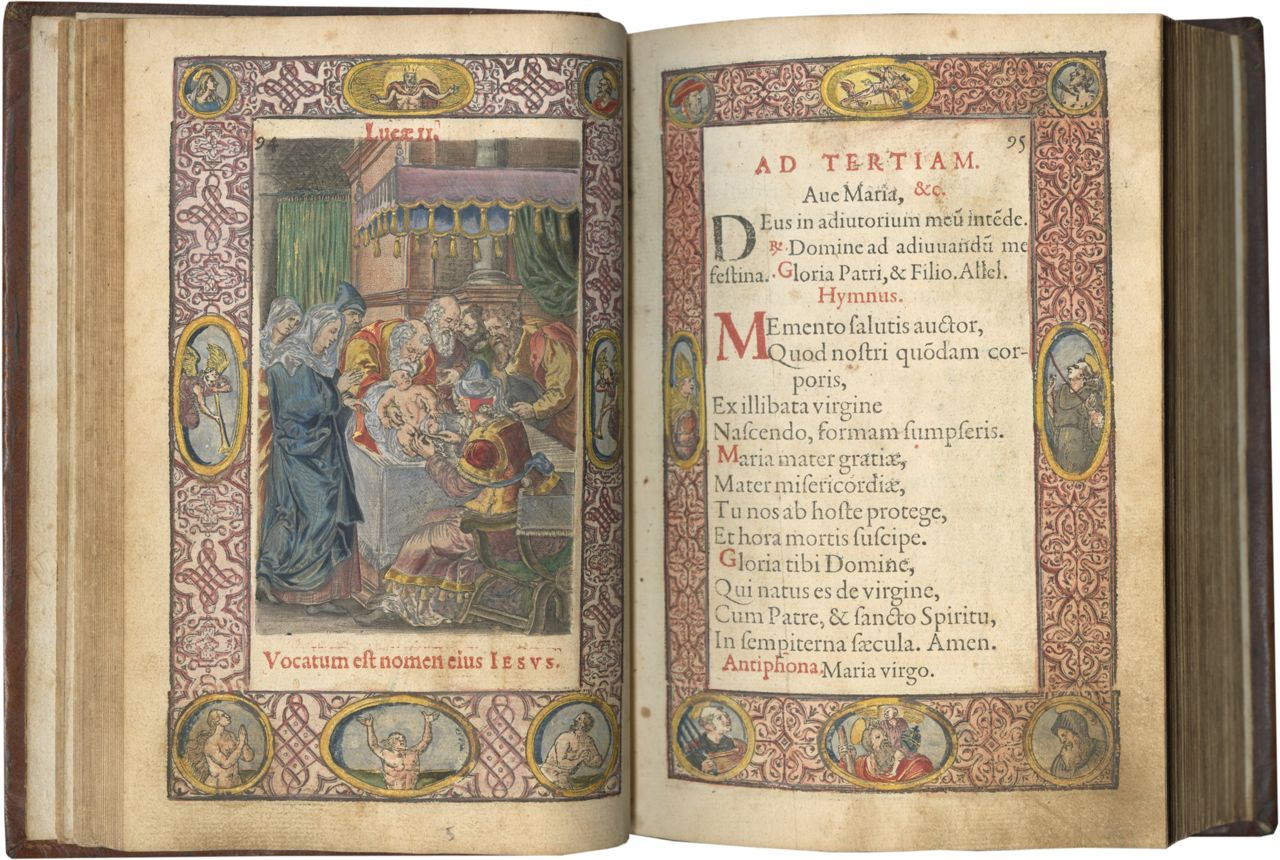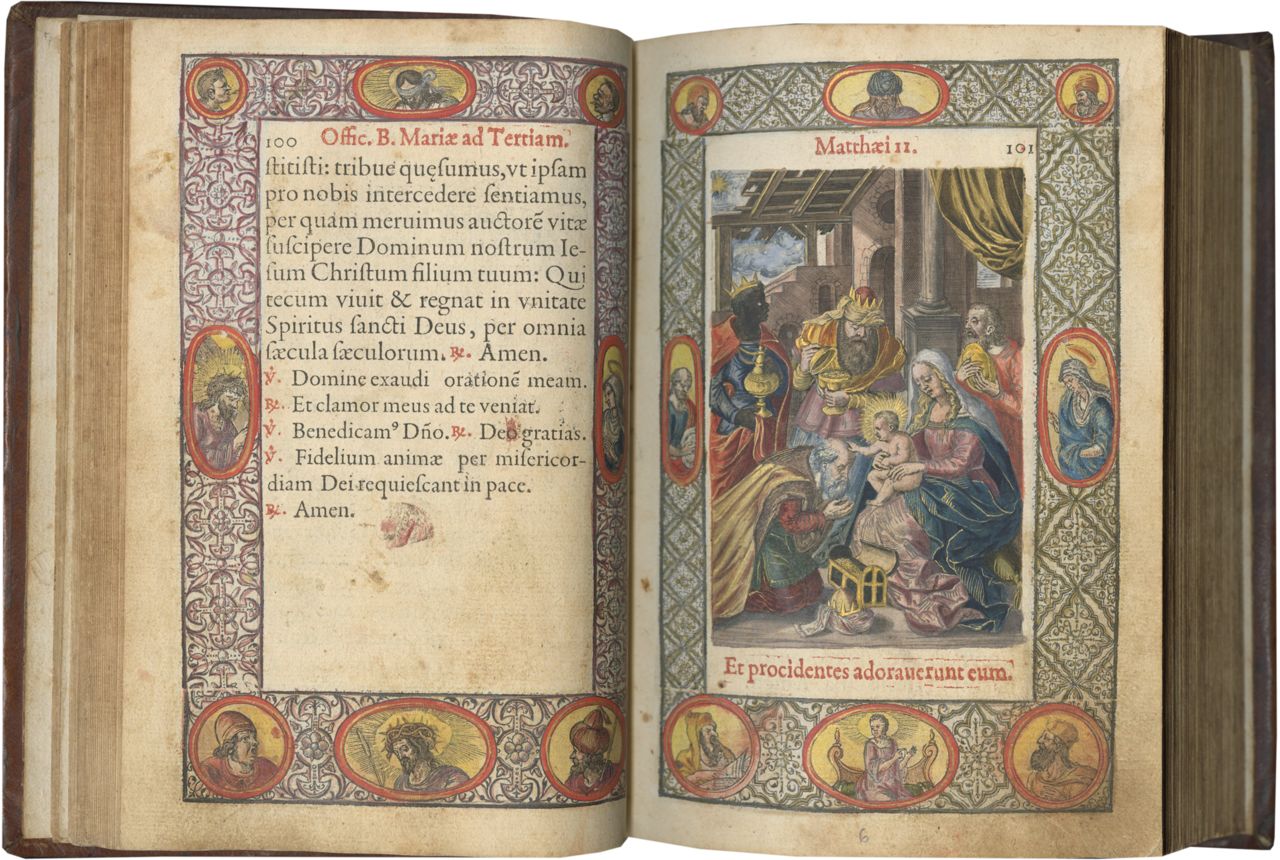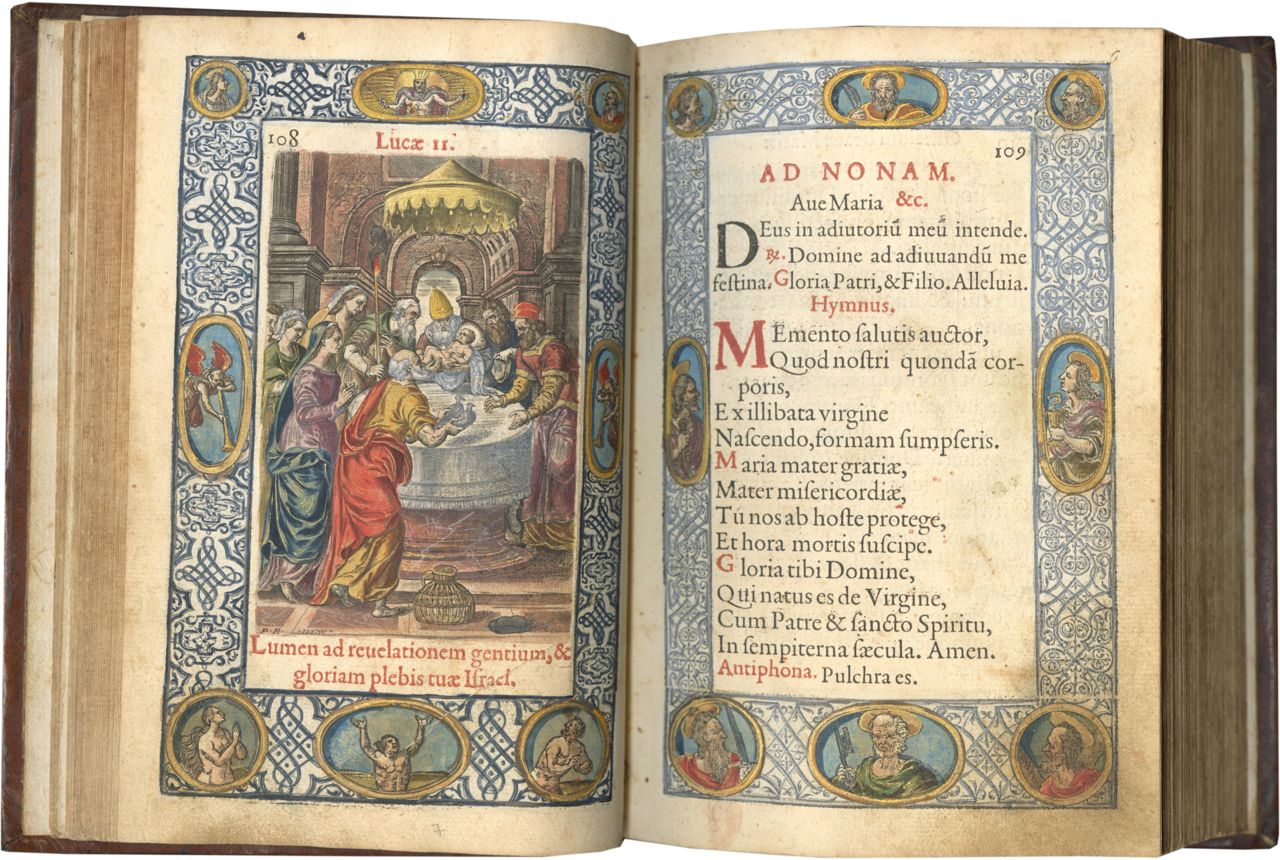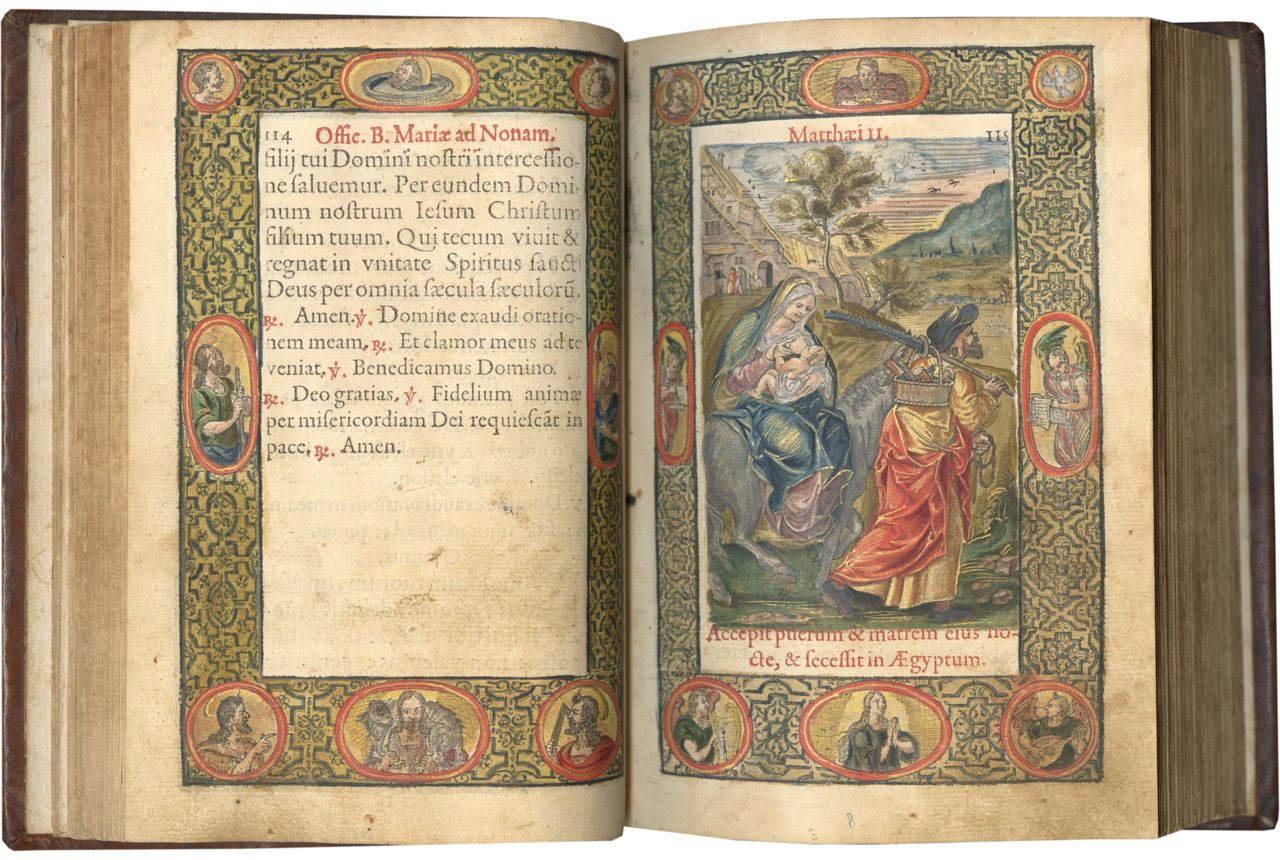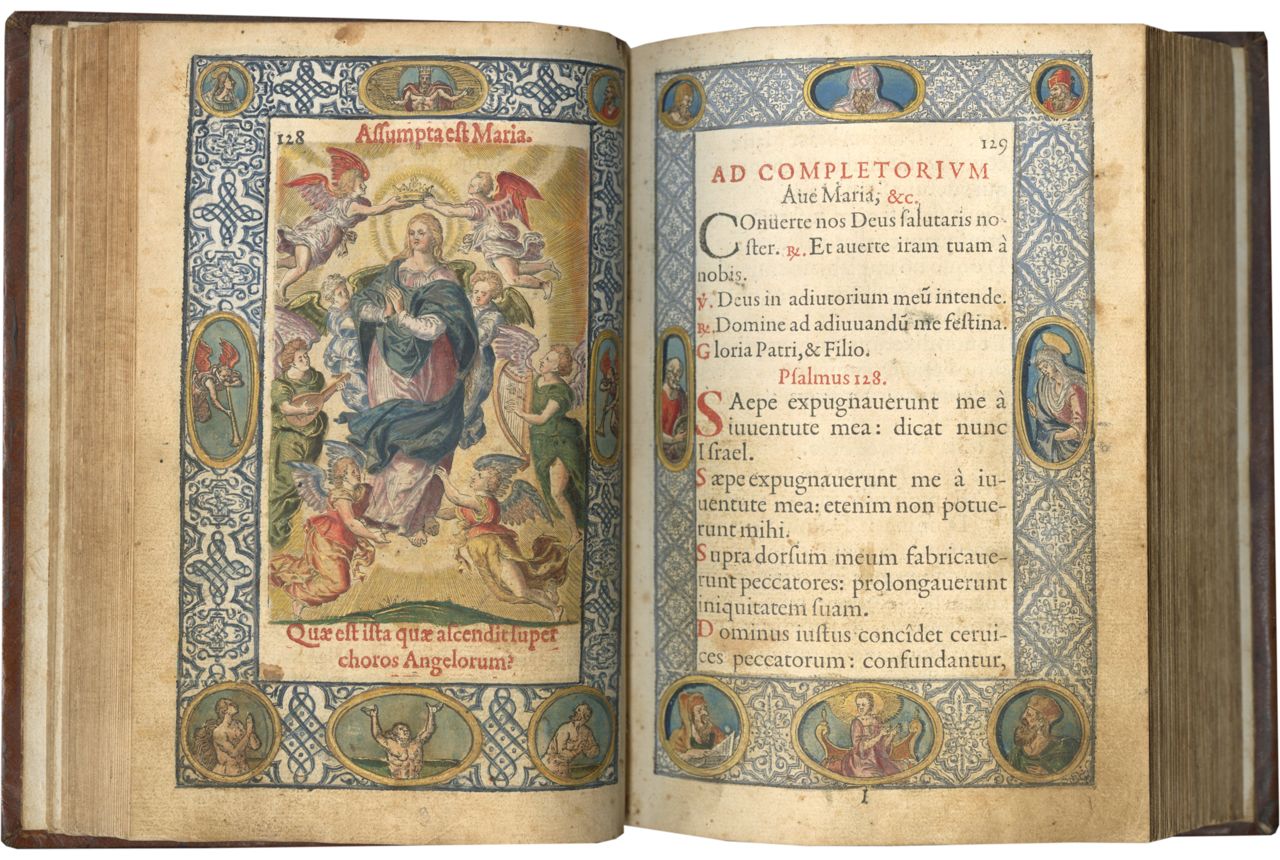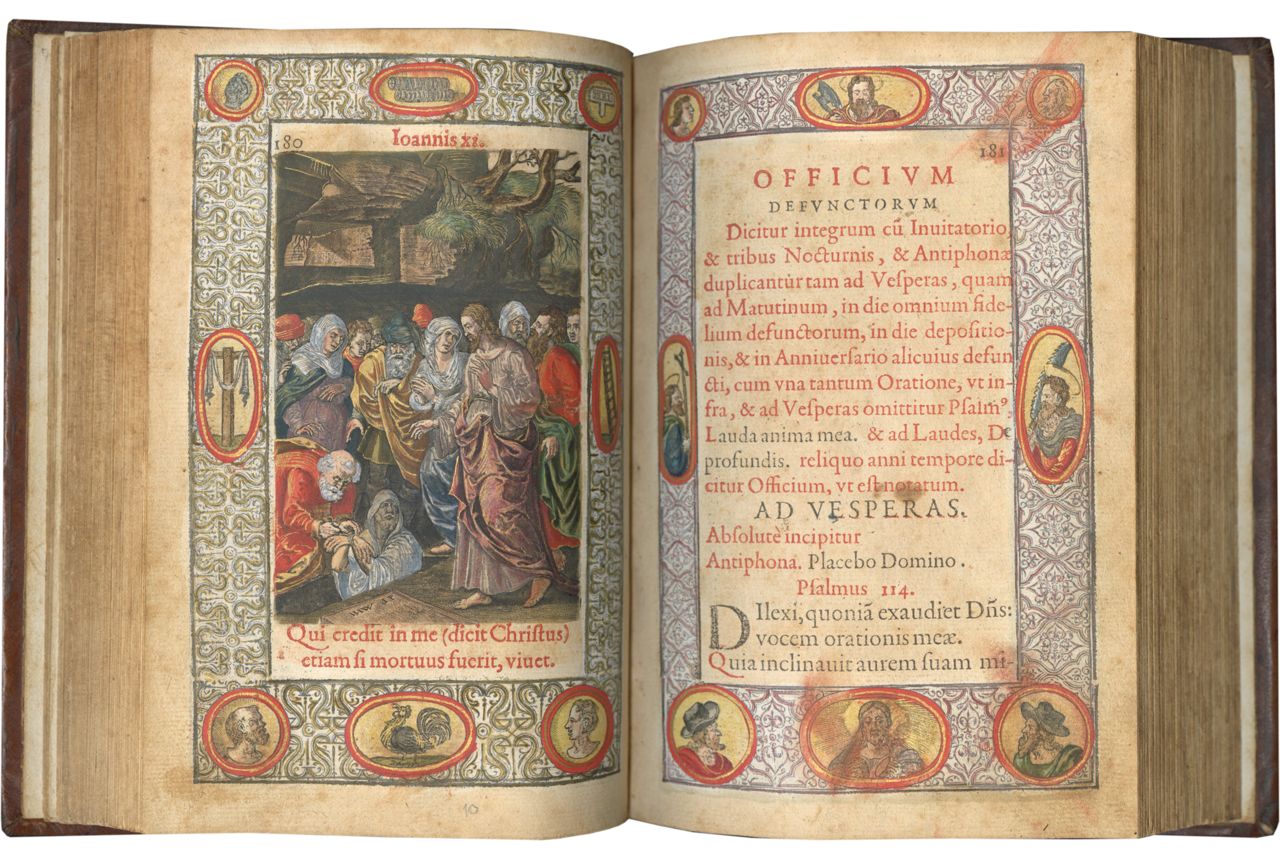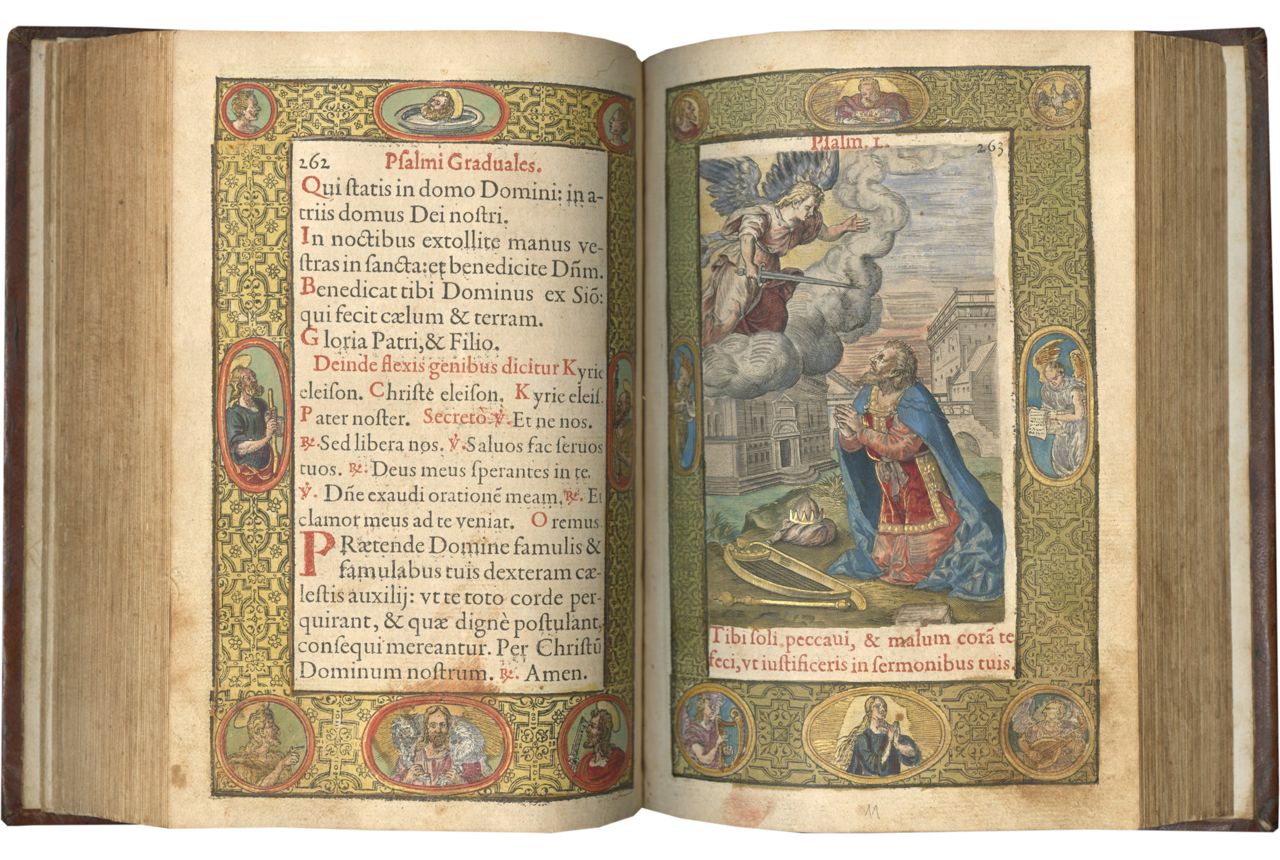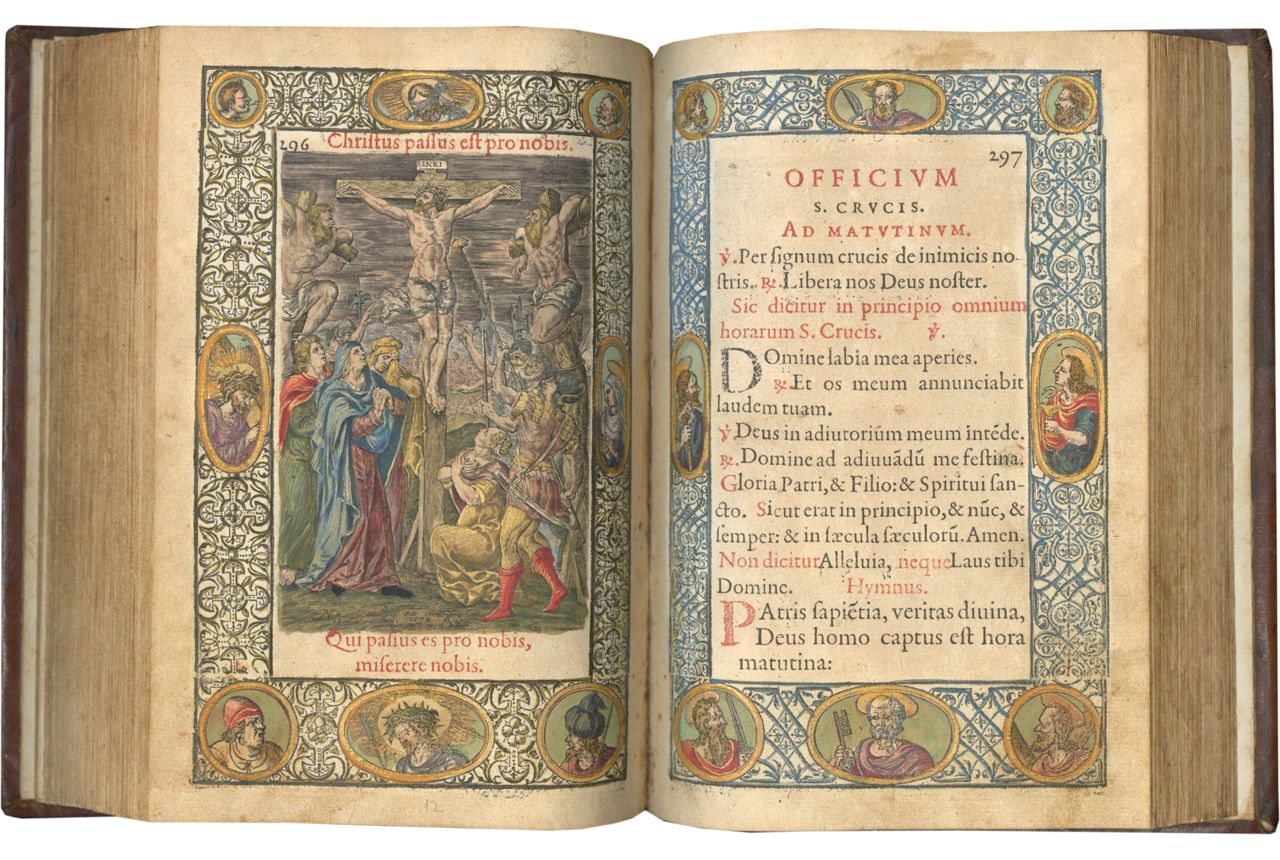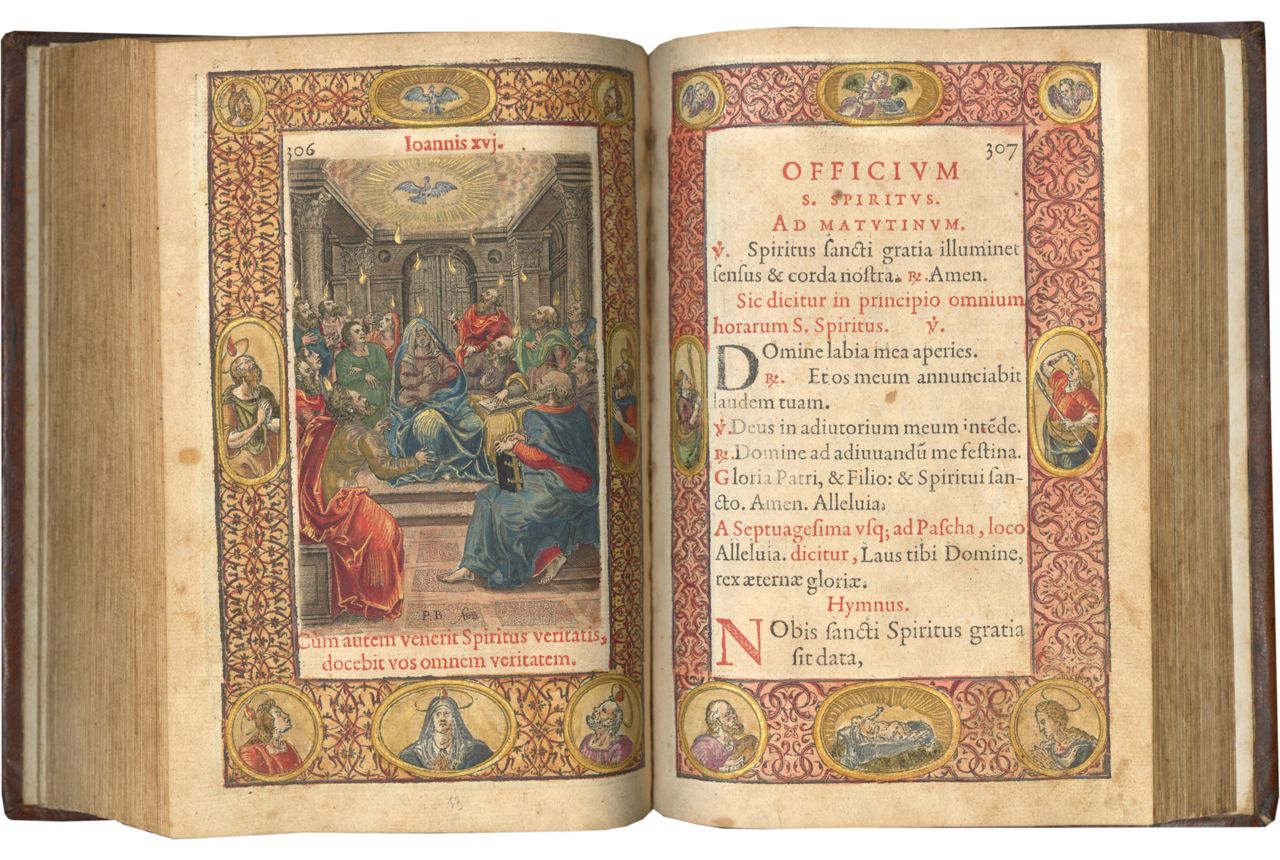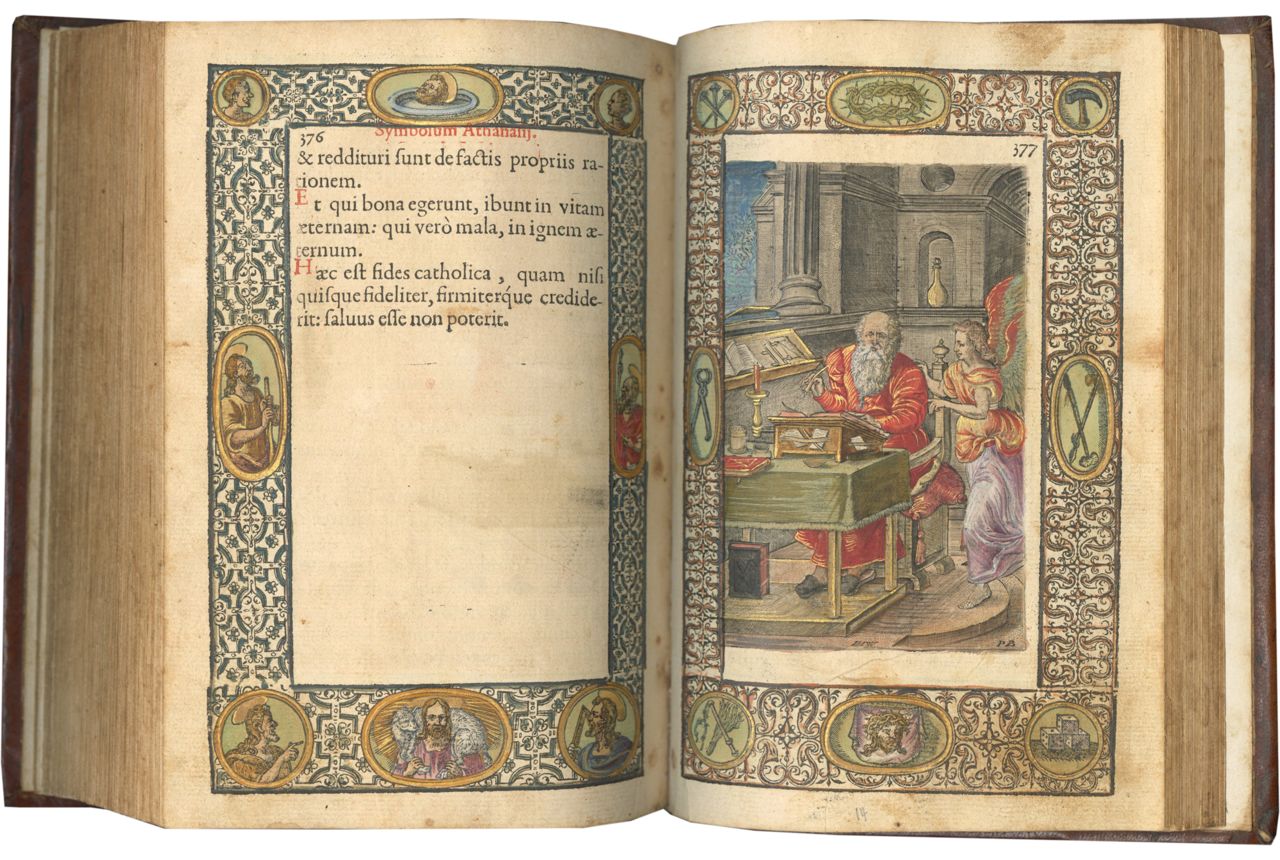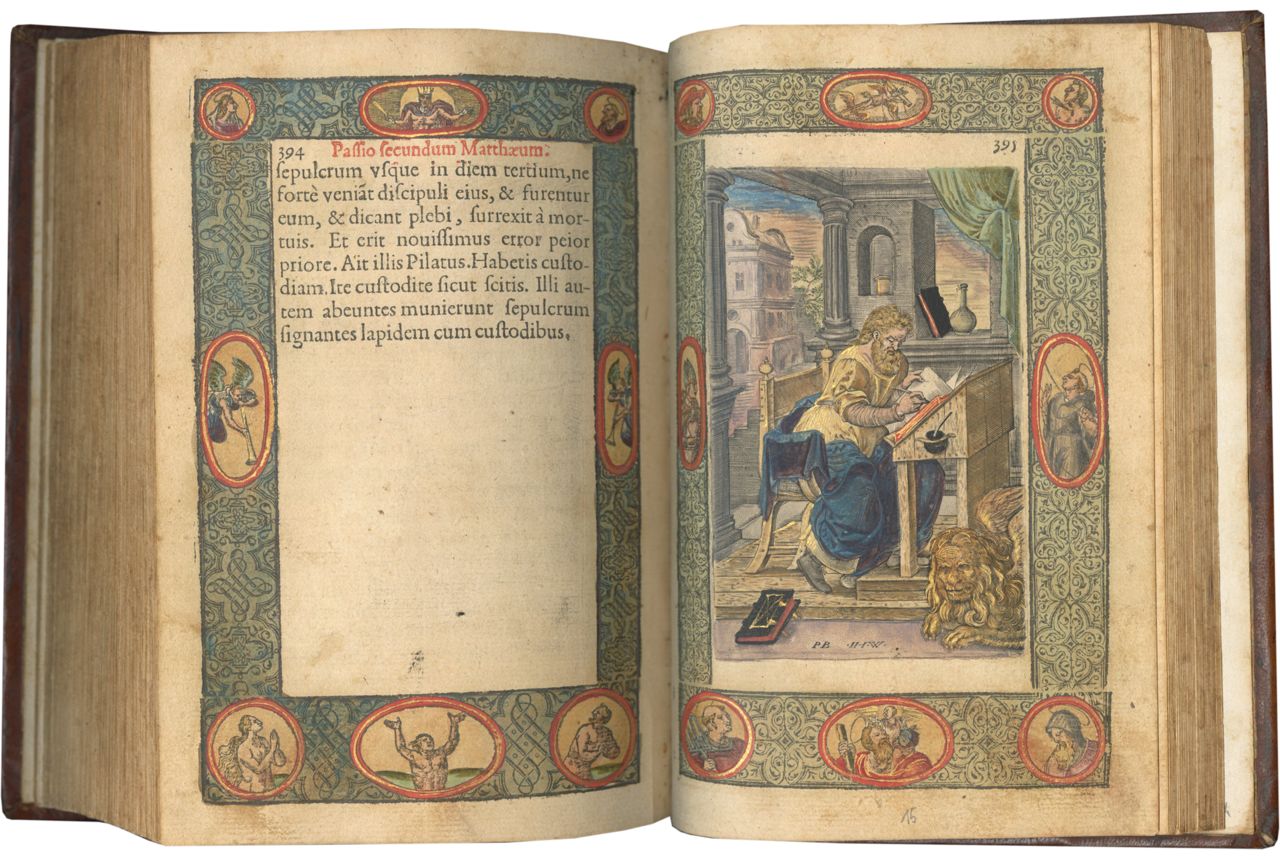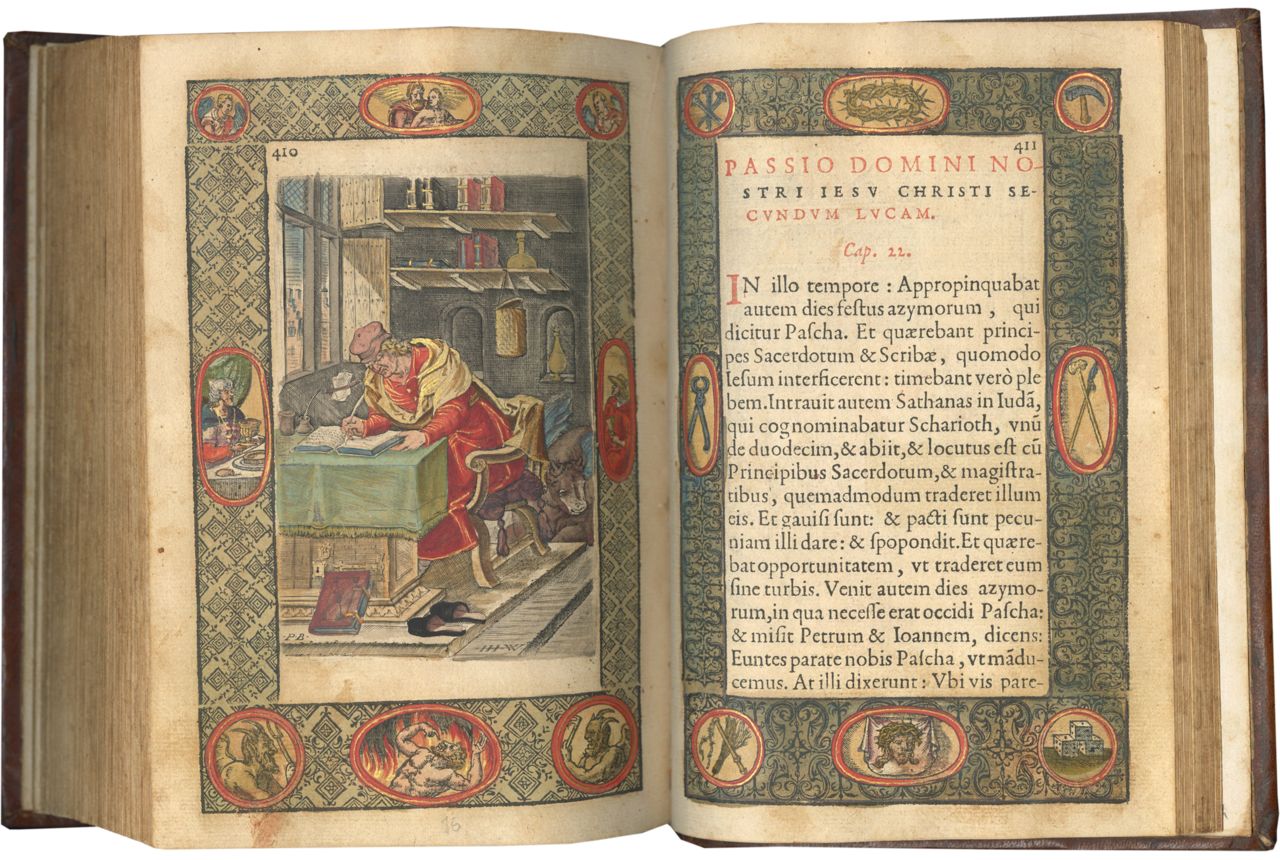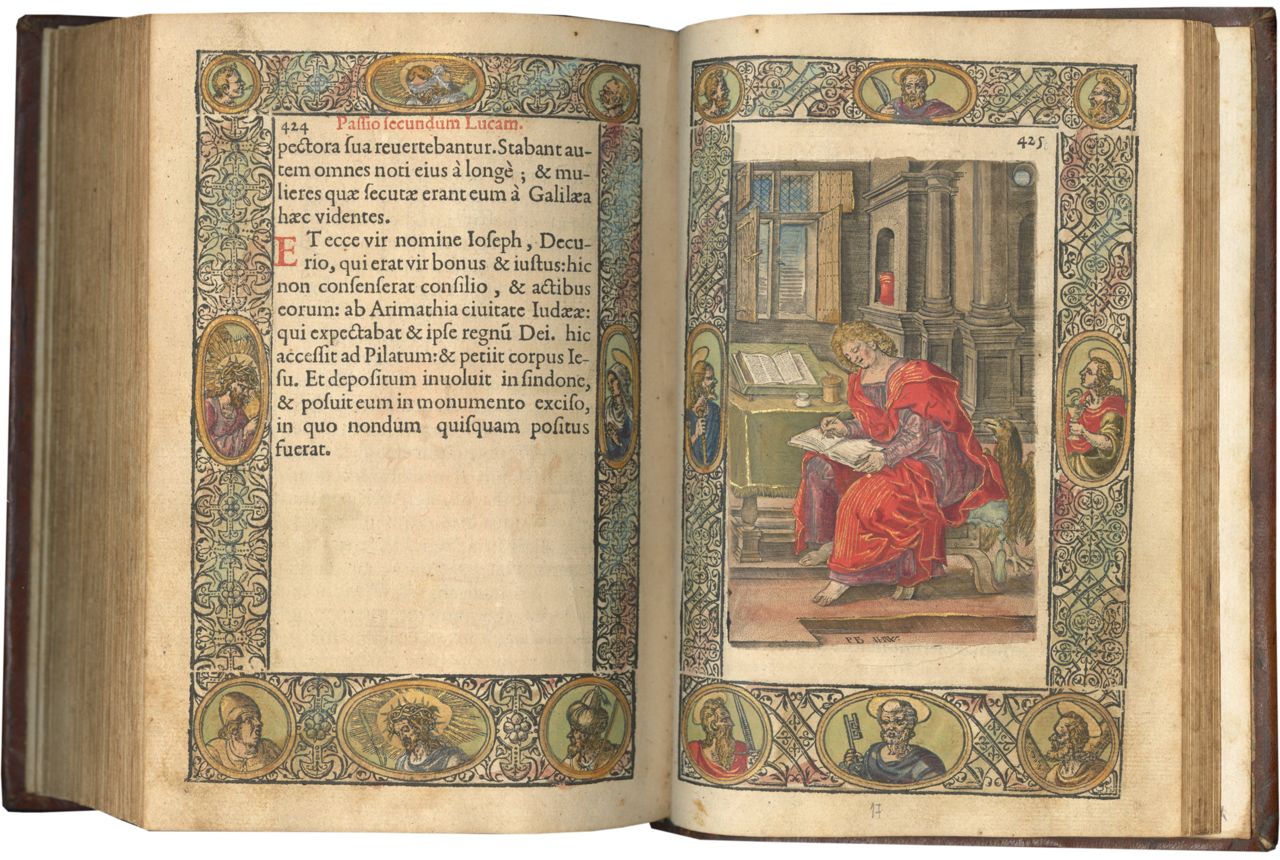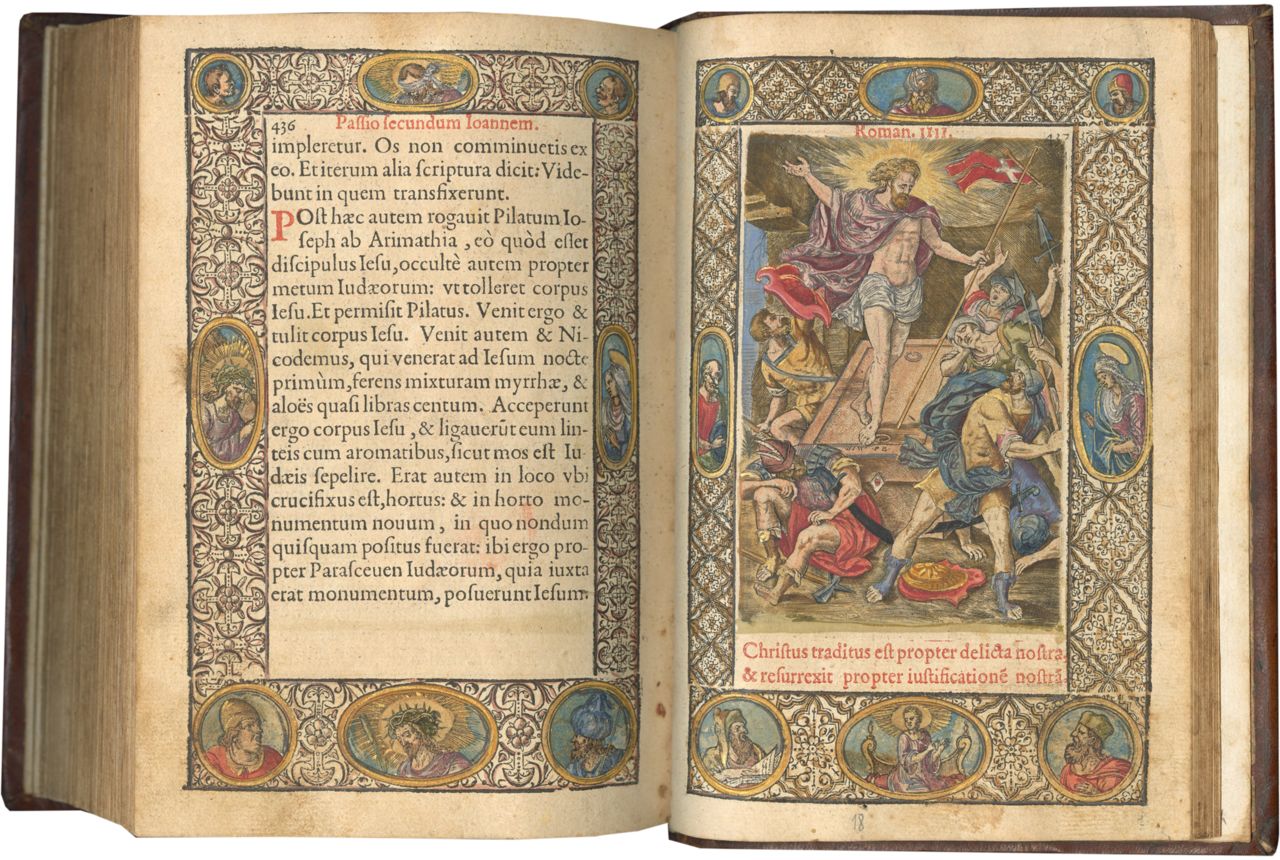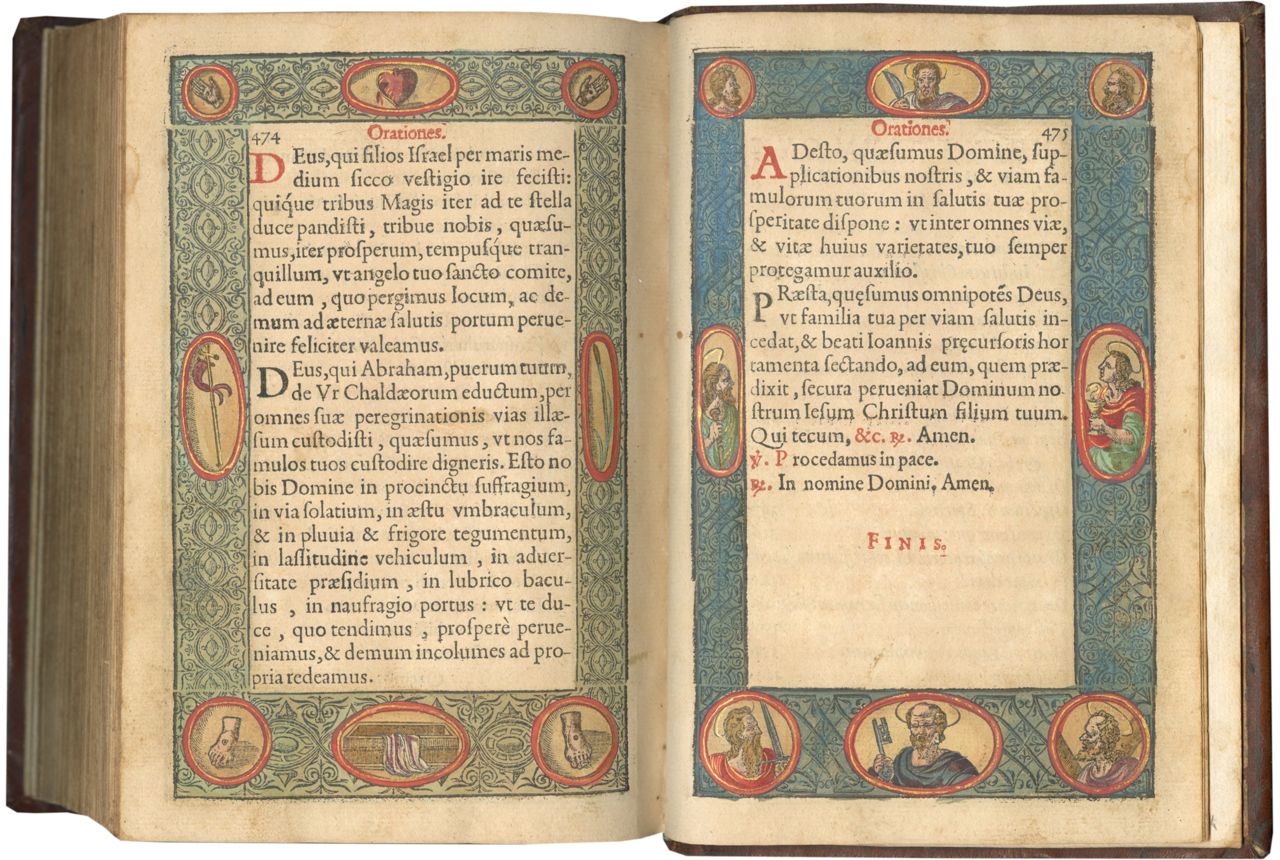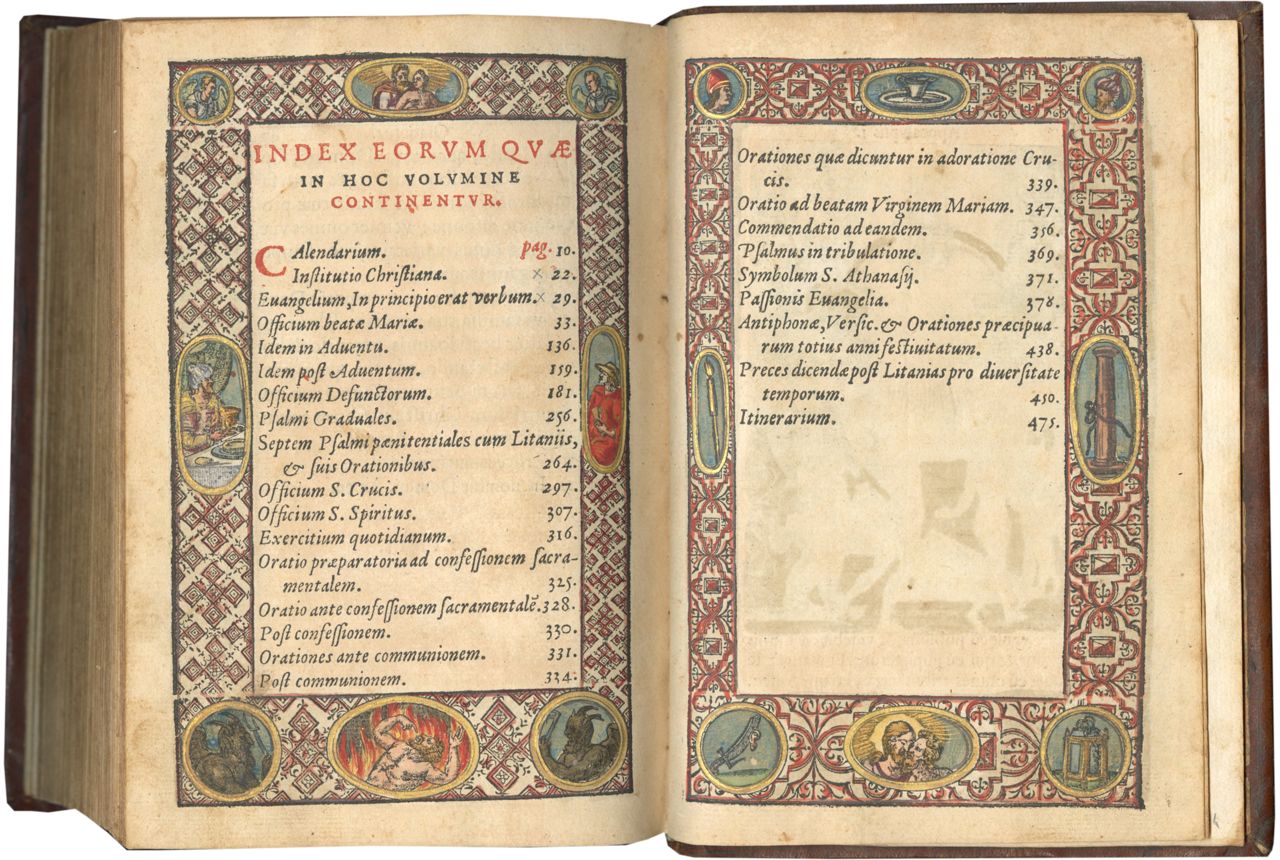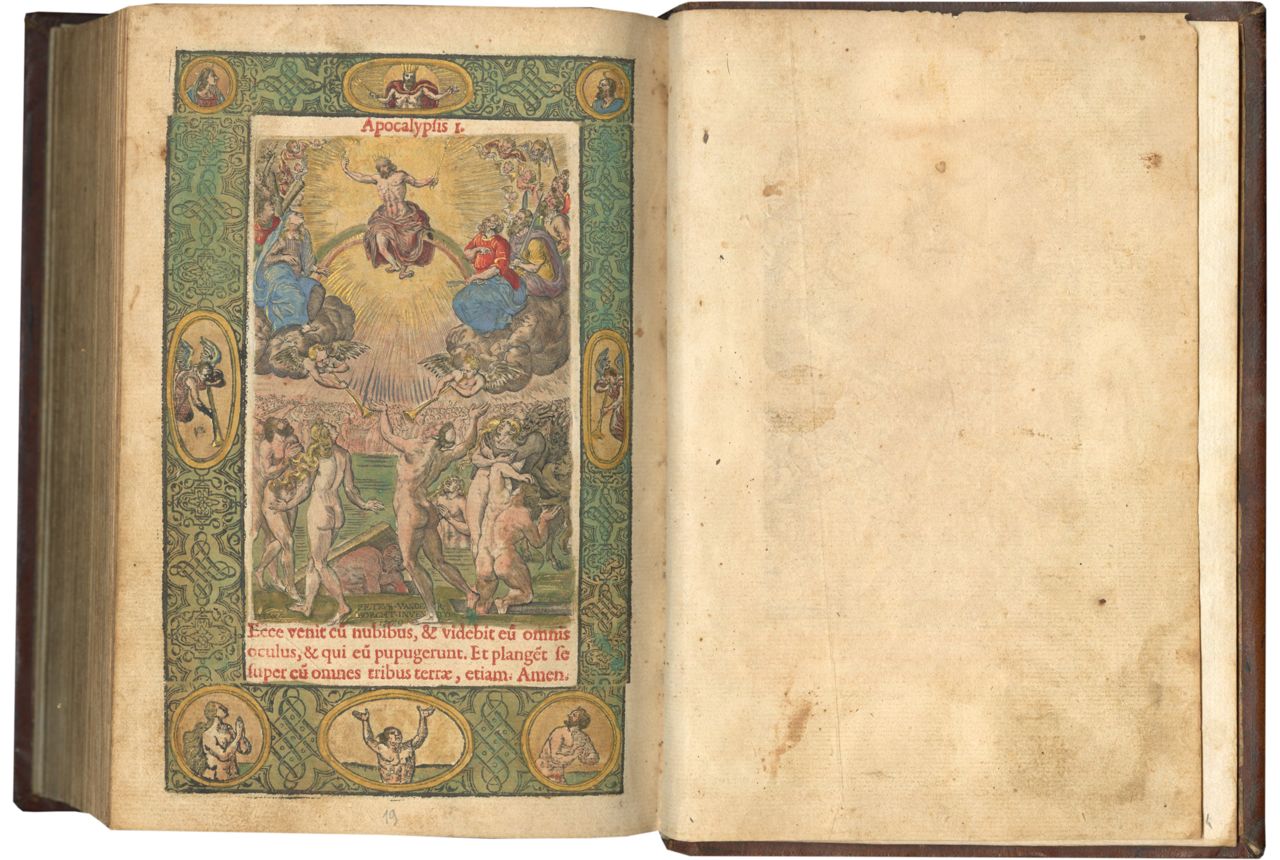8vo, i +238 + i folios on paper, no watermark visible, printed pagination, 3-16, 33-475, lacking eight leaves (quire B, containing calendar months August-December + five other leaves, without the accompanying Hymnal) (collation [A]8 [lacking quire B]8 [C] -Z8 a-g8, flyleaf at the end is part of the last quire; quires A and C are not signed), alphabetic quire signatures only in the lower margin of the first leaf of the quire, text within a frame of borders on each side (justification of text within the frame 132 x 77 mm.), printed in Roman font on 21-24 lines (pp. 3-7 on 31 lines) in single column in black and red inks, running titles and rubrics in red, 2-line printed initials alternating in red and black, each page with engraved historiated borders with eight medallions, of which 16 different sets alternate, 1 large engraving on titlepage and 19 full-page engravings, all hand-illuminated with a wide range of colors and liquid gold, a few stains, the inner margin of pp. 33/34 skillfully repaired, some lower corners very thumbed and dark, otherwise in excellent condition. Bound in the nineteenth century in reddish brown morocco over pasteboards, blind-tooled with a simple frame of three fillets, spine with four raised bands, blind-tooled with fillets, edges gilt, modern slipcase, leather slightly worn, but in overall very good condition. Dimensions 193 x 130 mm.
This is a rare beautifully painted copy of one of the earliest printings of the reformed Book of Hours, following the Council of Trent in 1572. Grand and richly illustrated with hand-illuminated engravings, this “new” Book of Hours was published by the famous Antwerp printer-publisher Christopher Plantin. Many surviving copies are uncolored, but every page in our volume is lushly painted in many colors and liquid gold. Borders in copies of this edition also vary; this example includes the most deluxe type with historiated medallions on every page.
Provenance
1.Printed in Antwerp, as stated on the titlepage, at the press of Christopher Plantin (1520-1589).
2. Annotated, “Radix Jesse” under the miniature on p. 33 in the nineteenth century.
3. Armorial bookplate of K. G. E. Kretzschmar on the front flyleaf.
Text
p. (1), [unpaginated, titlepage], “Officium Beatae Mariae Virginis, Nuper reformatum, et Pii V. Pont. Max. iussu editum. Antverpiae, Ex officina Christophori Plantini. M.D.LXXV”; [p. (2), unpaginated, blank];
pp. 3-6, “Summarium Constitutionis, et indulgentiarum, ac Decretorum S. D. N. D. Pii Papae V. Super recitatione Officii B. Mariae Virginis”;
p. 7, “Pius PP. V. Dilecto filio Christophoro Plantino, In civitate Antverpiensi librorum impressori“;
p. 8, “Index festorum mobilium pro XL annis”, from 1567 to 1606;
p. 9, “Quando inchoatur Adventus Domini. Adventus Domini inchoatur Dominia proximiori festo sancti Andreae, vel ipsa die sancti Andreae, fi in Dominica venerit...”;
pp. 10-16, Calendar, January-July; [Lacking pp. 17-32];
p. 33, Tree of Jesse [Illustration];
pp. 34-135, Hours of the Virgin;
pp. 136-158, Office of the Virgin for Advent;
pp. 159-179, Office of the Virgin after Advent;
pp. 180-255, Office of the Dead;
pp. 256-262, Gradual Psalms;
pp. 263-281, Seven Penitential Psalms;
pp. 282-295, Litanies, followed by prayers;
pp. 296-305, Hours of the Cross;
pp. 306-315, Hours of the Holy Spirit;
pp. 316-324, Exercitium Quotidianum;
pp. 324-376, prayers to be said before and after Confession, before and after Communion, when meditating the Passion, for Mary (including Obsecro te, O intemerata, Stabat Mater), for Christ, and the Athanasian Creed;
pp. 377-394, Passion of Christ according to Matthew;
pp. 395-409, Passion of Christ according to Mark;
pp. 410-424, Passion of Christ according to Luke;
pp. 425-436, Passion of Christ according to John;
pp. 438-475, Prayers for different feasts throughout the liturgical year and for different circumstances;
pp. (476-477), [unpaginated], list of contents;
p. (478), [unpaginated], Last Judgment [illustration].
Published in Antwerp, as stated on the titlepage. Although the edition was published in “M. D. LXXV” (1575), as printed on the title page, Karen Lee Bowen has established that “all variants of this edition were set and printed between September and November 1574”; our book represents the variant C of this edition (cf. Bowen, 1997, pp. 242-243, fig. 111; see also Voet 1980-1983, cat. no. 1775 C; Bowen, “Wierix...”, p. 143; Pettegree and Walsby, 2011, no. 10871, listing one location. See also Bohatta, 1924, no. 200; and Lacombe, 1927, nos. 587/589. Not listed in Bibliotheca Catholica Neerlandica, 1954.
Illustration
The volume is illustrated with fine hand-illuminated copper engravings by Jan Wierix (1549-1618), signed “IHW”, Peeter van der Borcht (c. 1535-1608), signed “PB” or “P” or “IP” (Bowen, “Wierix...”, p. 148), Abraham de Bruyn (c. 1538-1587?), signed “ADB”, and Pieter Huys (1519-1581?), signed “PH” or “P HVIIS.” In addition, every page is framed with one of sixteen different engraved borders, each with eight medallions depicting various religious symbols and scenes, and the busts of saints; these borders are also hand-illuminated.
Jan, also known as Johannes Wierix (1549-1618), together with his two younger brothers, were among the most prolific of the numerous engravers active in Antwerp in the second half of the sixteenth and in the early seventeenth centuries. The majority of the Wierix’s production is religious and served the Counter-Reformation. They engraved in styles virtually indistinguishable from one another and their output is renowned for its technical sophistication and delicacy, perhaps best illustrated in the copies after Dürer and in the portraits. The book illustrations engraved by the Wierix brothers rank among the finest of their time; they were mainly intended for religious books, a great number of which were published Plantin in Antwerp.
Peeter van der Borcht (c. 1535-1608) was a draughtsman and engraver, active in the field of printmaking for a relatively long period. Few prints he was involved in seem to have been done on his own initiative. He was a professional designer that print publishers called upon whenever they wanted to issue a certain series or an illustrated book. He would subsequently submit preparatory drawings or copperplates with etched images done by himself or under his supervision. Apart from Christophe Plantin, he served the interesting Adriaen Huybrechts (Huberti), Johan Baptista Vrients and others.
One large, engraved medallion on the titlepage:
p. (1), Assumption of the Virgin, “PB IHW”; the sequence of the initials indicates that the composition is designed by Peeter van der Borcht and the plate is engraved by Jan Wierix; Mauquoy-Hendrickz, 1982, no. 2150.
19 full-page engraved miniatures:
p. 33, Tree of Jesse, anonymous; Mauquoy-Hendrickz, 1982, no. 2177;
p. 34, Annunciation to the Virgin, anonymous; Mauquoy-Hendrickz, 1982, no. 2181c;
Bowen, “Wierix...”, p. 134, fig. 81;
p. 64, Visitation, “IHW”, i.e. designed and engraved by Jan Wierix; Mauquoy-Hendrickz,
1982, no. 2182;
p. 87, Nativity, “PB PH”; Mauquoy-Hendrickz, 1982, no. 2184;
p. 94, Circumcision, “IHW P”; Mauquoy-Hendrickz, 1982, no. 2185;
p. 101, Adoration of the Magi, anonymous; Mauquoy-Hendrickz, 1982, no. 2187;
p. 108, Presentation in the Temple, “PB IHW”; Mauquoy-Hendrickz, 1982, no. 2188;
p. 115, Flight into Egypt, “PB”; Mauquoy-Hendrickz, 1982, no. 2190;
p. 128, Assumption of the Virgin, anonymous; Mauquoy-Hendrickz, 1982, no. 2219;
p. 180, Raising of Lazarus, “IHW IP”; Mauquoy-Hendrickz, 1982, no. 2197;
p. 263, King David and the Angel, anonymous; Mauquoy-Hendrickz, 1982, no. 2178;
p. 296, Crucifixion, “PB IHW 1572”; Mauquoy-Hendrickz, 1982, no. 2209;
p. 306, Pentecost, “PB ADB”; Mauquoy-Hendrickz, 1982, no. 2216;
p. 377, St. Matthew, “IHW PB”; Mauquoy-Hendrickz, 1982, no. 2222;
p. 395, St. Mark, “PB IHW”; Mauquoy-Hendrickz, 1982, no. 2223;
p. 410, St. Luke, “PB IHW”; Mauquoy-Hendrickz, 1982, no. 2224;
p. 425, St. John, “PB IHW”; Mauquoy-Hendrickz, 1982, no. 2225;
p. 437, Resurrection, “IHW PB”, Mauquoy-Hendrickz, 1982, no. 2212;
p. (478), Last Judgment, “PETRUS VAN DER BORCHT INVENTOR 1570” and “IHW.”
The history of the Plantin-Moretus Press begins with its founder, Christopher Plantin (1520-1589), who created one of the most successful publishing and printing establishments of all times. Antwerp was an established center of printing woodcuts, engravings, and books, and with the success of the Plantin press, became one of the centers of the international booktrade.
Between 1557, two years after he had begun his business as a printer, and 1589, Christopher Plantin oversaw the production of sixty distinct Books of Hours. The decrees of the Council of Trent mandating a new, revised Book of Hours, meant that the traditional text found here was obsolete c. 1571. Our volume was the last Book of Hours in an octavo format that Plantin would publish, following his first octavo edition in 1570, and his second edition of the reformed Book of Hours in 1573 (cf. Bowen, “Wierix...”, p. 143). Copies in this edition were printed with three types of borders: historiated woodcut borders, historiated engraved borders, or engraved borders with flowers, animals and putti; our copy has historiated engraved borders. Moreover, the engraved full-page miniatures vary within this edition to the extent that “each copy was illustrated with a distinct series of plates” (Bowen, “Wierix...”, p. 144). Although the subjects and compositions were established and fixed, multiple plates made after the same composition were used for the printing. For instance, as many as four distinct plates after compositions by Jan Wierix were used concurrently for printing the Presentation and the Visitation in the various copies of the edition (cf. Bowen, “Wierix...”, p. 144). This enabled printing a large edition quickly.
The illustrations were engraved on copper plates and printed separately from the text on an intaglio press. Plantin employed a group of engravers who executed the plates in the five to six years that preceded the publication. According to Plantin’s own estimates, the plates wore out after about 1000 impressions, after which a new plate had to be made (cf. Bowen, 2003, p. 3). Thus, the impressions of the same image within the same edition are not uniform, as the plates could be “refaictes” or “retaillés” (redone or recut); some of the editions of Plantin’s books of hours exceeded 2000 copies (Bowen, “Wierix...”, p. 136). For example, the plate of the Last Judgment, designed in 1570 by Peeter van der Borcht and engraved by Jan Wierix, was used for printing the Last Judgment in our copy and in Oxford, Bodleian Library, 8° 09 Th. A replica of this miniature, which was designed by van der Borcht in 1572 and engraved by Jan Wierix, was likewise used in copies of the same 1575 edition now in Brussels (Koninklijke Bibliotheek Albert I, L.P. 2862 A and FS IX 70 A), Antwerp (Museum Plantin-Moretus, R 54.24) and Vienna (Nationalbibliothek, 22.F.21) (cf. Bowen, “Wierix...”, 149).
Literature
Bibliotheca Catholica Neerlandica, impressa 1500-1727, Hagae Comitis, M. Nijhoff, 1954 (this edition not listed).
Bohatta, H. Bibliographie der Livres d’Heures: Horae BMV, Officia, Hortuli Animae, Coronae BMV, Rosaria und Cursus BMV des XV und XVI Jahrhunderts, Vienna, 1924, no. 200.
Bowen, K. L. Christopher Plantin’s Books of Hours: Illustration and Production, Nieuwkoop, 1997.
Bowen, K. L. “Wierix and Plantin: A Question of Originals and Copies,” Print Quarterly 14:2 (1997), pp. 131-150.
Bowen, K. L. “Illustrating Books with Engravings: Plantin’s Working Practices Revealed,” Print Quarterly 20:1 (2003), pp. 3-34.
Bowen, K. L. and D. Imhof. “Reputation and Wage: The Case of Engravers Who Worked for the Plantin-Moretus Press,” Simiolus: Netherlands Quarterly for the History of Art 30:3/4 (2003), pp. 161-195.
Lacombe, P. Livres d’heures imprimés au XVe et XVIe siècle conservés dans les bibliothèques publiques de Paris, Paris, 1907, no. 587/589.
Mauquoy-Hendrickz, M. Les estampes des Wierix, Brussels, 1982.
Pettegree, Andrew and Malcolm Walsby. Netherlandish Books, Leiden and Boston, 2011, no. 10871.
Voet, L. The Plantin Press (1555-1589): A Bibliography of the Works Printed and Published by Christopher Plantin at Antwerp and Leiden, Amsterdam, 1980-1983.
Online Resources
Christopher Plantin
http://spcoll.library.uvic.ca/Digit/physiologum/commentary/bio_plantin.htm
TM 1174


